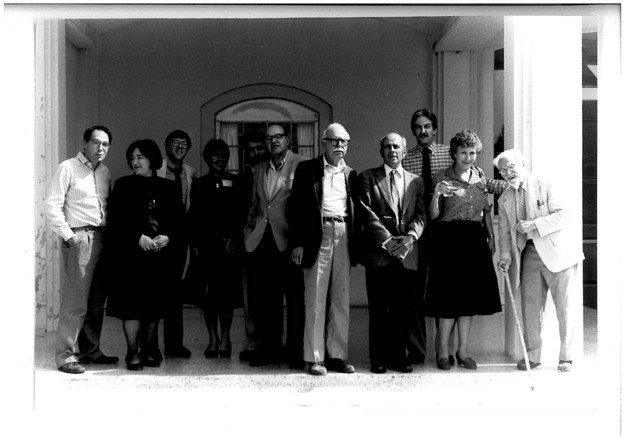
What Is a Poet? Meeting Louis Simpson in 1984

In 1984, Hank Lazer convened this group for “What Is a Poet?” Lots more (and higher-res) photos and a pdf, newly OCR’d and hi-res, along with Lazer’s intro, is at EPC Library.
full res photo above.
Here is an early exchange from the panel:
Simpson: 1 don't think anybody here, any poet of this panel, would deny the absolutely useful function of good criticism. But I personally as a poet today find certain tendencies in criticism which I consider bad. They may have had a grain of truth in them, but as far as what I consider the making of poetry to be, they are very harmful. … There are more serious questions being raised, such as, I think, Charles's basic point, and I mink Marjorie shares it to some point –- the attempt to remove from the poet himself or herself some sort of controlling truth. This is a point on which we will not agree. And to think that culture produces poems – this is a very fighting point on which we will not agree.
[A short while later, Simpson continues:]
Well, my function I said yesterday was, I'm a worker; critics work very hard, I know. But what l mean is my function is a primary one, as Denise said; I'm up against the coal face, chunking out this coal. Then I bring it to the surface; then management takes over. [Laughter ] Now between labor and management, there's going to be a certain amount of really valid ongoing disagreement, and they are not the same function; they are different. And if I were a professional critic, my function would be quite different from the one I have. Now when I get a little upset is when I see management – or let's drop that metaphor – when I see critics elevating Language poetry (to put my cards on the table) to a very high level; language, it seems to me, starts to get out of touch with the coal face, and something very strange happens to poetry. You cannot become that abstract about it. And it starts to destroy contemporary poetry.
*
In his intro, Lazer quotes most of this later exchange:
Simpson: I think I’m beginning to see a basic reason we’re disagreeing here. You approach the world as a construct which humanity has made, and therefore language is a construct, so you approach experience through language. I would argue that for poets experience occurs as a primary thing, without language in between. I quoted Dante yesterday to you about visions. We have visions, we have experiences for which there is not language, and our job is to create that into a poem. And that seems to me a radically different point of view.
Gregor Jay: O, yeah, yeah. We do disagree fundamentally because I don’t think that there is any such thing as uninterpreted experience and I don’t think we ever have an experience of anything that isn’t an interpretation when it arrives to our knowledge.
Simpson: I don’t believe that for one second. If you had been in an automobile accident, or I could give you even worse examples – if you’ve ever had somebody shooting at you in a battlefield, where the heck is interpretation coming in there?
Jay: Well, I have to decide whether the bullet’s going to hit me or not, Louis.
Simpson: But what has that got to do with interpretation?
Levertov: If a child dying of cancer is suffering excruciating pain just as if it were a grown-up person who is able to reflect upon its pain, does that mean that it is not experiencing that excruciating pain? Bullshit!
Bernstein: Of course it doesn’t mean that. I think, I mean nobody is saying that. I think we’re not going to resolve what are essentially philosophical and theological or metaphysical differences, religious differences, really, among us. If you had a panel of different religious people representing different religious groups you would, who were trying to come to some consensus, you would have some of these same disagreements. I think the problem I have is not so much understanding that people have a different viewpoint than I have – believe me I've been told that many times [laughter] and I accept that. I do find it a problem that, and I certainly tend to do this too, that we tend to say "poets" think this and "poets" think that – because by doing that we tend to exclude the practices of other people in our society of divergence.